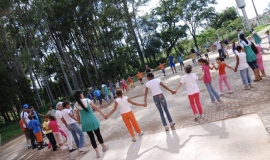"I was born in Cidade Dom Bosco. We had a shack that was inside the work and that was later bought by Fr Ernesto Sassida. My family comes from the North-East and I have eight other siblings and we were all welcomed in the center. That's why I love it." This is the story of Lindivalda Gonçalves dos Santos, today coordinator of the distance adoption program, one of the many projects offered in the Salesian center. Like Lindivalda, hundreds of people have already benefited from long-distance adoption, an economic patronage for the growth of children and young people aged 6 to 17, extendable up to the age of 22 if "the godfather or godmother" decide to contribute to the beneficiary's university education.
Even Jonathan do Bonfim Ramos, now 24 years old, had his life radically changed by a Salesian social center. Nine years ago, he entered the karate workshop at the Mary Help of Christians Center (CEMAM) in Petrolina, but he encountered many difficulties in following the lessons, due to the situation of social vulnerability in which he found himself, together with his mother and a brother, a situation which worsened when Jonathan's mother died. "At that time, we did not have a structured team that could provide the assistance Jonathan needed, but teachers and staff mobilized to help," says Doralice Gomes, CEMAM's administrative coordinator. Thanks to the commitment of many, Jonathan is now a black belt, teaches karate in an academy and continues to participate in CEMAM lessons.
In Manaus the "Pró-menor Dom Bosco" has been at the service of adolescents and young people from socially vulnerable families for 38 years. "Pró-Menor tries to reverse this situation by providing adolescents and young people with food, education, vocational training, good use of free time and human and Christian formation," explains Antonildo Corrêa Serrão, administrative coordinator of the center.
Strengthening family ties is one of the objectives of the "Casa do Puríssimo Coração de Maria", in the municipality of Guaratinguetá. There they work to improve the intra-family relations of two thirds of the students' families through meetings, formation, moments of fraternity and sharing, as well as specific individual assistance as needed.
Assistance to adolescents in the program of socio-educational corrective measures is one of the strengths of the Salesian Institute of Assistant Social (ISAS), in Curitiba. The young people in the center are started up offering services to the community and included in the various projects provided by the ISAS. "Thus, in addition to helping these young people meet the requirements of socio-educational measures, we can give them opportunities for personal and social development," concludes Douglas Laskoski Fonseca, Executive Director of the institution.


